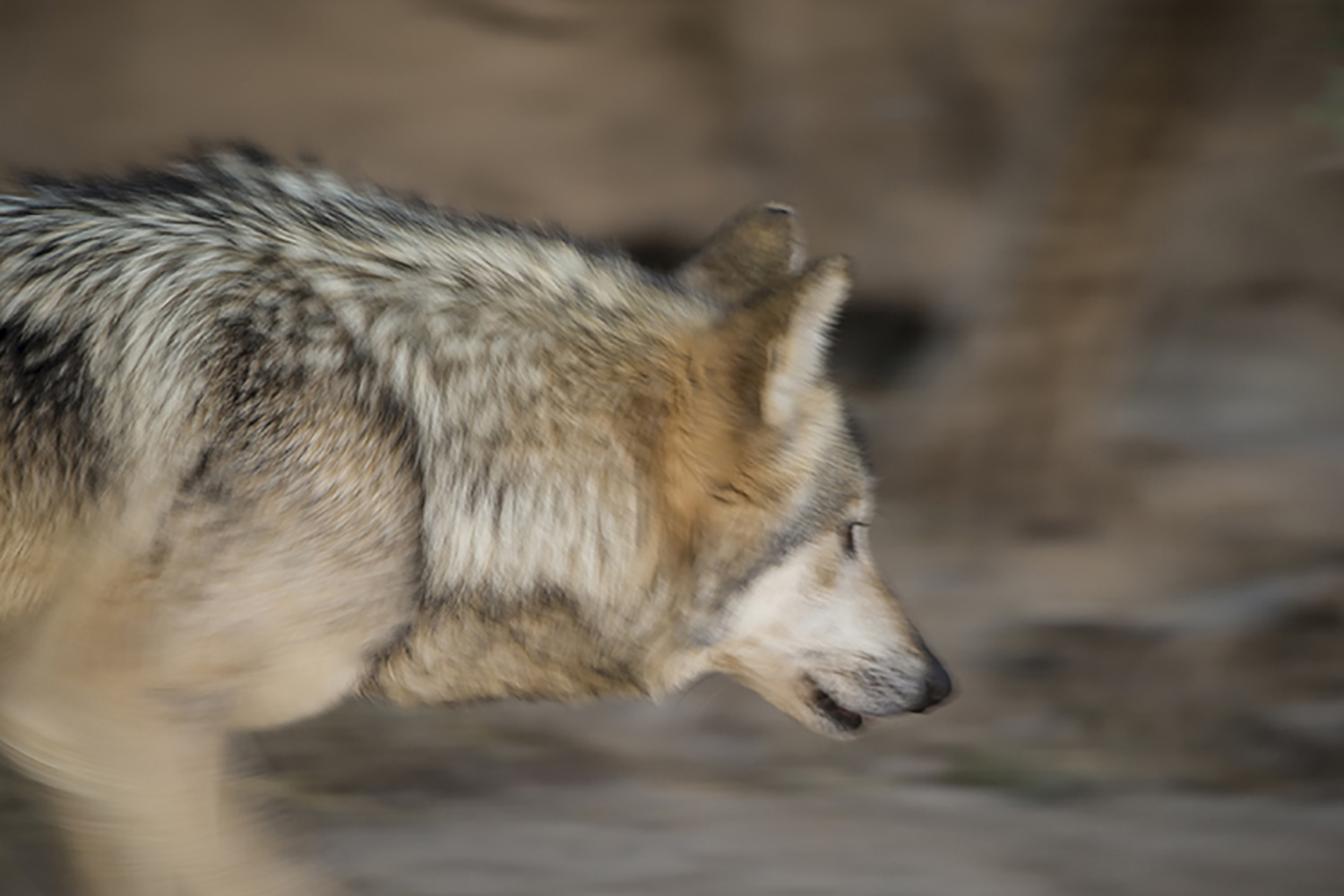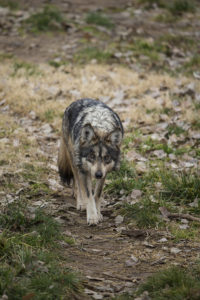
Mexican wolf (Canis lupus baileyi), an endangered species in the Southwest. (Controlled situation). (Photo copyright 2016 by Tim Christie, all rights reserved).
IT’S FAR BETTER THAN THE OLD-FASHIONED CELL HIS GRANDPARENTS LIVED AND BRED IN TWENTY YEARS AGO. HERE, AT least, he can feel the sun on his back, roll in the grass, and escape from the prying eyes of visitors if he chooses. But it is still a cage. The chain link fence is buried two feet into the ground and folded back underneath to ensure that he doesn’t dig his way out. There is a path worn into the dirt just inside the fence where he trots, the spring-steel wolf lope carrying him effortlessly around the acre of landscaped compound, lap after lap, mile after mile.
If there were a way to ask him why he continues his ceaseless rounds, what he’s looking for, I’m sure he’d reply within the compass of his own experience. He would probably ask for another five pounds of meat or a female in heat. Not freedom, certainly, since he has no grasp of it. If he were turned loose on the tundra where his great-grandfather was whelped, he would probably die of starvation or be ripped to shreds by the resident wolves. And yet, whether he knows it or not, I think I know why he runs. He is hunting caribou, still hunting after four generations in a cage.
It may be stretching a metaphor too far to empathize with him, but I don’t think so. More than ninety percent of us live in cities these days. Most of us are at least two generations removed from the farm and perhaps 400 generations removed from the days when men left home in the morning with spears in their hands for appointments with bison and mammoths. We’ve done our best to domesticate ourselves in all those years to serve as an example of what the tamed beast should be. For the advantaged, our cities are large and comfortable, at least inside the rather selective parameters we use to gauge comfort. If we were asked what more we could possibly want, we would reply within the compass of our own experience. A sixty-inch television perhaps, or a new car. We would explain our unfocused restlessness and depressions, the coronaries and nervous breakdowns, the three-martini lunches, the addictions and suicides, as individual aberrations. And yet I think I know why we run.

Mexican wolf (Canis lupus baileyi), an endangered species in the Southwest. Controlled situation). (Photo copyright 2016 Tim Christie, all rights reserved).
Under the thin veneer of civilization we’ve imposed on ourselves, we are still largely untamed creatures living in cages of our own making, penned in with a constant, fundamental contradiction. We pride ourselves on our penetrating insight, our astonishing technological aptitude, but we’re faintly uncomfortable with our appetite for beef. We dote on our gifted children filling classrooms with newly discovered knowledge but chastise them for staring out the window on a warm spring afternoon. We make plans to visit other planets and try to forget our fear of the dark. In short, we are pleased to have the intellectual legacy of our African ancestors but embarrassed by the covenant that comes with it.
The last 8,000 years of Western culture have been characterized by our violent struggle to deny that covenant. Somewhere in the transition from hunter-gatherer to farmer, we took up the destruction of wilderness with a terrible enthusiasm. It was more than an effort to protect our flocks and fields, more than the pursuit of wealth. For many generations, it amounted to a holy war.
We had nearly finished the job before we began to recognize the potential cost. The list of practical values of wild places has mounted with our understanding of native environments. At the turn of the last century, we finally recognized what wetlands and timber meant to the protection of topsoil and clean water. In the years since, we have found out much more: the possibility of new drugs and fibers; natural pesticides to protect our crops, new genes to make them more efficient; natural processes that soften the effects of global warming, pollution, and desertification. There has been sophisticated discussion of natural diversity as an investment in global stability— something even a Wall Street stockbroker can appreciate.
What we still fail to appreciate is the place wildness occupies in the human spirit. All too often, we still assume we can excise the need for it from our character without disturbing anything else. That’s not too surprising— after all, it’s the way we’ve dealt with every other unruly facet of nature we’ve encountered. Maybe it’s time we took a lesson from our failures. All our best efforts notwithstanding, we are beginning to find that the world doesn’t run properly without some measure of wildness in it. The same can be said of the human animal itself. Whether we recognize it or not, our hunt is still going on— the same restless search to the horizon that has brought us from the plains of the African Pliocene to where we are now. If we’re far enough removed from wilderness, we may not even recognize the root of the feeling, but that makes little difference— we still can’t leave it behind. Now and then, it demands free rein in an empty place, a long run in the tall grass and timber. Without that, it will subside at last into pacing the perimeter of our circumscribed lives, without direction or rest, looking for a way out and finding none.
Leave a Reply
You must be logged in to post a comment.